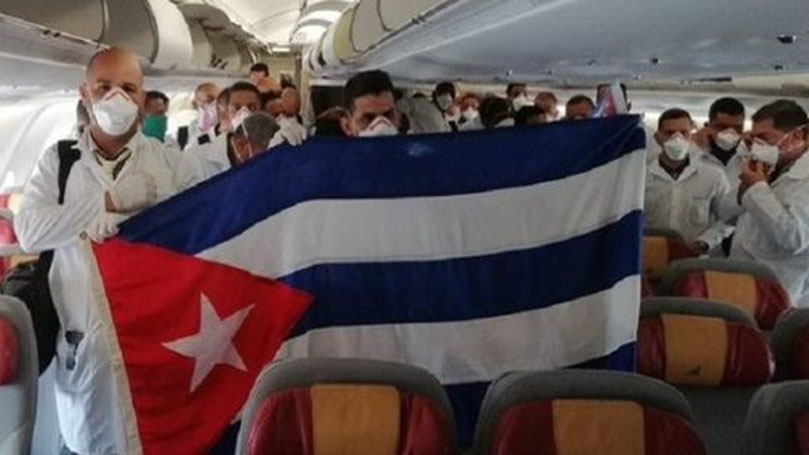
Hundreds of organizations in countries around the world are supporting the nomination of Cuba’s Henry Reeve Brigade for its international solidarity work in fighting the Covid-19 pandemic. But the Trump administration and the right wing in the United States are trying to sabotage this valuable contribution to public health, even going so far as to threaten countries that accept the help of the highly respected Cuban medics.
To counter these shameful actions by our own government, it behooves us, as citizens and residents of the United States, to organize the strongest possible support movement for the Henry Reeve Brigade that we can muster. There are many ways to do this, and an important one that is strongly gaining ground is to support the Brigade for this year’s Nobel Peace Prize.
What is the Henry Reeve Brigade?[i] This is a group of Cuban doctors and health-care workers formed by President Fidel Castro in 2005 with the idea of traveling to New Orleans to provide help to the thousands of people impacted by Hurricane Katrina in that year. So the first country to which the Brigade offered its assistance was, in fact, the United States, but the government of George W. Bush rudely rebuffed the offer, despite the well-documented need for such services. Instead, the Henry Reeve Brigade was redeployed to other countries in need, notably to help after a massive earthquake in Pakistan in October of that same year. Since then the contingent has worked in a great many countries all over the world. The Cuban doctors worked alongside U.S. and other international medical contingents in the aftermath of the earthquake that hit Haiti in January 2010, in an atmosphere of mutual respect and cooperation. And in 2014, the Brigade performed heroically in the context of the terrifying Ebola epidemic in West Africa. In recognition of this, the main Norwegian labor union federation nominated it for the Nobel Peace Prize in 2015. However, the prize was given to two other very worthy candidates who were outstanding in their fight for the rights of children: Pakistan’s Malala Yousafzai and India’s Kailash Satyarthi.
Actually, Cuba had been sending doctors to numerous poor countries since 1963. This is made possible because Cuba has built up its own high quality health-care system, and its supply of highly trained doctors and other health professionals, to the point that it has far more doctors relative to its population than the United States has, and of course many more than those available to the poor countries of Asia, Africa, and Latin America. The Cuban medical system has adopted a preventive public health approach, which has allowed Cuba to surpass many more wealthy countries on numerous measures of quality of health and health care. Doctors and health-care workers receive absolutely free training, and patients receive absolutely free services as well.
The value of this approach is now illustrated by Cuba’s own Covid-19 statistics; by means of a strong quarantine regime and intensive community outreach, infections and deaths in Cuba, though not zero (there have been 85 deaths as of June 20), are far fewer than in many other Latin American countries, and proportionately much lower than in the United States.
It comes as no surprise that Cuba has mobilized its international health solidarity resources to help fight the Covid-19 pandemic in many countries all over the world. Already in 2019, 28,000 Cuban health solidarity workers were applying their skills and dedication in 59 different countries. Now more have been sent overseas, including the crack Henry Reeve Brigade. The Cuban solidarity work has been praised in countries rich and poor, and even some countries with right-wing governments have gratefully accepted the Cuban help.
And how has the U.S. government responded—with praise and offers to cooperate? On the contrary! For some time, there have been efforts by U.S. officialdom to undermine the Cuban health-care system by trying to get Cuban doctors on overseas health solidarity missions to defect to the United States, using the promise of big salaries here. Now the Trump administration and some Republican politicians have decided to go on the attack, not only against the Cuban health-care system abroad and on the island, but against those countries which have asked for and received Cuba’s solidarity help.
The Trump administration uses specious claims about the Cuban health workers as propaganda to support its sabotage efforts. It claims that the health workers are being exploited to provide money for the Cuban national budget, and that therefore countries which host them are engaged in “human trafficking.” Now Republican Senators Ted Cruz, Marco Rubio, and Rick Scott, all Republicans, are introducing legislation that would threaten any country which contracts with Cuba for health-care personnel with possible sanctions for such “trafficking.”
These accusations are ridiculous; the health workers are willing volunteers, and they serve in order to help sick people overseas and also help their own country, which has been the target of a vicious 60-year economic blockade by the United States. The Cuban doctors’ services are provided free to the poorest countries, but Cuba is itself hardly wealthy. So why should Cuba, with its population of slightly over 11 million and a per capita Gross Domestic Product (Purchasing Power Parity method) of about $12,000 per year, be expected, in effect, to provide “foreign aid” to Italy, with a population of over 60 million and a per capita GDP of about $40,000 per year?
The threat by the Trump administration and the three Republican senators to sanction countries that receive this help from the Cubans has caused deep offense, being seen, correctly, as one more U.S. attack on the national sovereignty of poorer countries. Sir Ronald Sanders, ambassador of Antigua and Barbuda to both the United States and the Organization of American States, responded sharply to the threats, pointing out, among other things, that Cuba has also helped train doctors for the Caribbean nations, and that the United States is offering these countries absolutely no help during the Covid-19 crisis. Worse, the Trump administration is working to undermine the World Health Organization, another institution on which poorer nations rely to get help in epidemics and other health emergencies.
The attacks on the Cuban health solidarity programs are on a par with other extremist foreign and domestic policies of the Trump administration and its backers. How can we, in the “belly of the beast,” the United States, counter this?
One way is to make sure we exercise our vote in November. The people of Cuba and of the countries that Trump, Cruz, Rubio, and Scott are now threatening cannot vote in the U.S. elections; only we can remove Trump and his minions from power.
But there are other ways too. There is a campaign to get city councils and state legislatures to pass resolutions calling for an end to the U.S. economic blockade of Cuba; as of last year, more than a dozen cities have already done so, with more in the pipeline, including New York City.
Nobel Peace Prize for the Henry Reeve Brigade
And now there is another big opportunity for us to speak out forcefully.
More than 168 organizations in dozens of countries around the world are engaged in a campaign to get the Nobel Peace Prize this year awarded to the Henry Reeve Brigade. This is a much larger effort than the one that fell short in 2014, and the high visibility of Cuba’s worldwide struggle against the Covid-19 epidemic increases the chances of success.
In the United States, a petition on the subject has been initiated by Code Pink and is supported by the National Network on Cuba, the Council on Hemispheric Affairs, the International Committee for Peace, Justice and Dignity, the CPUSA, and many other organizations.
Here is the link to the petition.
Please do the following:
*Sign the petition, adding supportive comments if you are so inspired.
*Circulate it online and in all your social media.
*Get all the organizations you can to join in this important campaign!
¡Viva la Brigada Henry Reeve!
[i] Full name in Spanish: Brigada Henry Reeve: Contingente Internacional de Médicos Especializados en Situaciones de Desastres y Graves Epidemias, or Henry Reeve Brigade: International Contingent of Doctors Specialized in Disaster Situations and Serious Epidemics. Henry Reeve (1850–1876) was an American who served in the Cuban Army during the 10-year war against the Spanish, rising to the rank of Brigadier General.
Image: Twitter @kandire_bo, Telesur.


 Join Now
Join Now